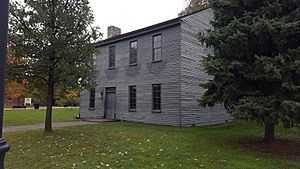Postville Courthouse State Historic Site facts for kids
The Postville Courthouse State Historic Site is a special place in Lincoln, Illinois, United States. It's a copy of an old county courthouse that was first built in 1840. This original building was later moved to Greenfield Village in Michigan. The courthouse you see today was built in 1953 and looks just like the first one.
This courthouse is famous because it was one of the places where Abraham Lincoln worked as a young lawyer. He traveled around central Illinois, going from one courtroom to another, which was called riding the "circuit." The Illinois Historic Preservation Agency now takes care of this historic site.
The First Courthouse in Postville

Postville was a new town on the frontier, started in 1835 by a man named Russell Post. In 1839, the government of Illinois created a new area called Logan County. The leaders of this new county picked Postville to be its main town, or "county seat," because it was in the middle of the county.
A simple wooden courthouse was built in Postville the next year, in 1840. It looked a lot like a regular house. Inside, it had a courtroom where legal cases were heard. It also had offices for important county officials like the county clerk and the sheriff.
This first Postville Courthouse served the people of Logan County for only eight years, from 1840 to 1848. After that, a nearby town called Mount Pulaski, Illinois offered to build a new brick courthouse if they could become the county seat. The county leaders agreed, hoping a brick building would be safer from fire. The Mount Pulaski Courthouse is still standing today.
Young Abraham Lincoln's Time
After the county seat moved from Postville, it moved again in 1855 to a new town built near the Chicago and Alton Railroad tracks. This new town was named Lincoln, Illinois, after the famous lawyer, Abraham Lincoln. Sadly, a fire in Lincoln in 1857 destroyed many of Logan County's old court records. Because of this, we don't know much about the specific cases Lincoln worked on at the Postville Courthouse.
When the Postville Courthouse was active, Abraham Lincoln was a young lawyer trying to make a name for himself. Back then, lawyers usually took on all kinds of cases, so Lincoln would have helped anyone who hired him.
Even though it was tough to be a lawyer on the frontier, Lincoln made many friends in Logan County. In 1846, the people of central Illinois elected him to serve in the U.S. House of Representatives. A few years later, in 1853, they named their new county seat after him. The town of Lincoln grew very quickly. By the 1860s, it had grown so much that it included Postville, and Postville became a part of Lincoln.
People who lived near the old Postville Courthouse shared interesting stories. One popular story says that Lincoln and other young lawyers would play "town ball" in the empty field across from the courthouse. Town ball was an old game, a bit like baseball, that they played while waiting for their court cases to begin.
The Courthouse's Journey and Replica
After Postville became part of Lincoln, the old courthouse was no longer used for court. It became a private home and slowly lost its importance. Then, in 1929, a famous inventor named Henry Ford bought the old building for $8,000. He loved collecting historic buildings.
Ford's workers carefully took the wooden courthouse apart, piece by piece. They even dug up its foundation. Then, they moved everything to the Henry Ford Museum and Greenfield Village in Dearborn, Michigan. The original Postville Courthouse was rebuilt there, using its original materials, and you can still see it in Michigan today.
The people of Lincoln were sad to lose this important piece of their history. They asked the state of Illinois to help. So, in 1953, the state built a new courthouse in Lincoln. This new building is an exact copy of the original Postville Courthouse, using the same measurements and details. This replica, furnished to look like a courtroom from the 1840s, is what we now know as the Postville Courthouse State Historic Site.

